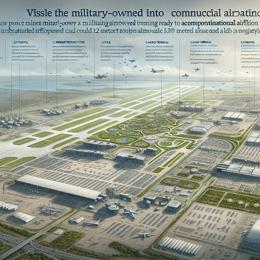Content created by AI
Cape Town Eyes New Aviation Heights: A Second Airport in the Pipeline
Cape Town, a bustling metropolis acclaimed for its stunning landscapes and vibrant economy, is contemplating a significant boost to its aviation infrastructure with the potential addition of a second airport. Cape Winelands Airport, currently serving as a general flying field and home to a flight training academy, could transform into a fully-fledged secondary airport, according to the facility's General Manager, Mark Wilkinson.
The expansion project could see the light of day by 2027, subject to several milestones. The airport, nestled in the picturesque Durbanville area, was once operated by the South African Air Force. Today, it stands privately owned, ripening with potential. This development is not merely a new airstrip but an envisaged node of economic activity and improved aeronautical logistics.
Wilkinson points to several critical benefits the expanded airport can offer. Chief among them is the proximity to Cape Town International Airport (CTIA), offering a viable alternative for flights unable to land at the primary hub. With CTIA currently shouldering the lion's share of regional and international air traffic, the creation of a supplementary facility can alleviate operational pressure and provide robust backup services.
In practical terms, airlines could reap significant cost savings, primarily through reduced fuel loads necessitated by the alternative landing option, bolstering both financial and environmental efficiency. Enhanced capacity for passengers and cargo stands to boost revenue streams for carriers, amplifying the airport's commercial allure.
Nonetheless, the merits of the venture extend beyond the airline industry. The socio-economic fabric of the region is anticipated to be invigorated through the creation of numerous jobs, thus fostering community development and individual livelihoods.
The execution of such grand plans does not proceed unexamined. Head of planning for the airport, Adele Klingenberg, provided insights into the ongoing environmental assessment. A rigorous regulatory process scrutinizes the potential environmental impacts, weighing the benefits against the potential drawbacks. This assessment is expected to draw to a close by the end of the following year. Should the findings favor development, the construction phase could commence in 2025.
While the anticipation builds, it’s emphasized that the dedication to regulatory compliance will not wane. Compliance and due diligence are pivotal in ensuring the expansion not only delivers operational benefits but also serves the interests of the local communities and aligns with broader environmental considerations.
An investment of approximately R7 billion is earmarked for the new airport, signalling a substantial commitment to Cape Town's future as a premier aviation and economic hub. Local communities, existing industries, and prospective investors alike are monitoring the unfolding development keenly, envisioning a more connected and prosperous future.
As the Cape Winelands Airport expansion navigates the labyrinth of planning and approval processes, the potential for a second airport crystallizes into a vision of economic growth and increased global connectivity for Cape Town – a prospect filled with opportunities and ready for takeoff.

